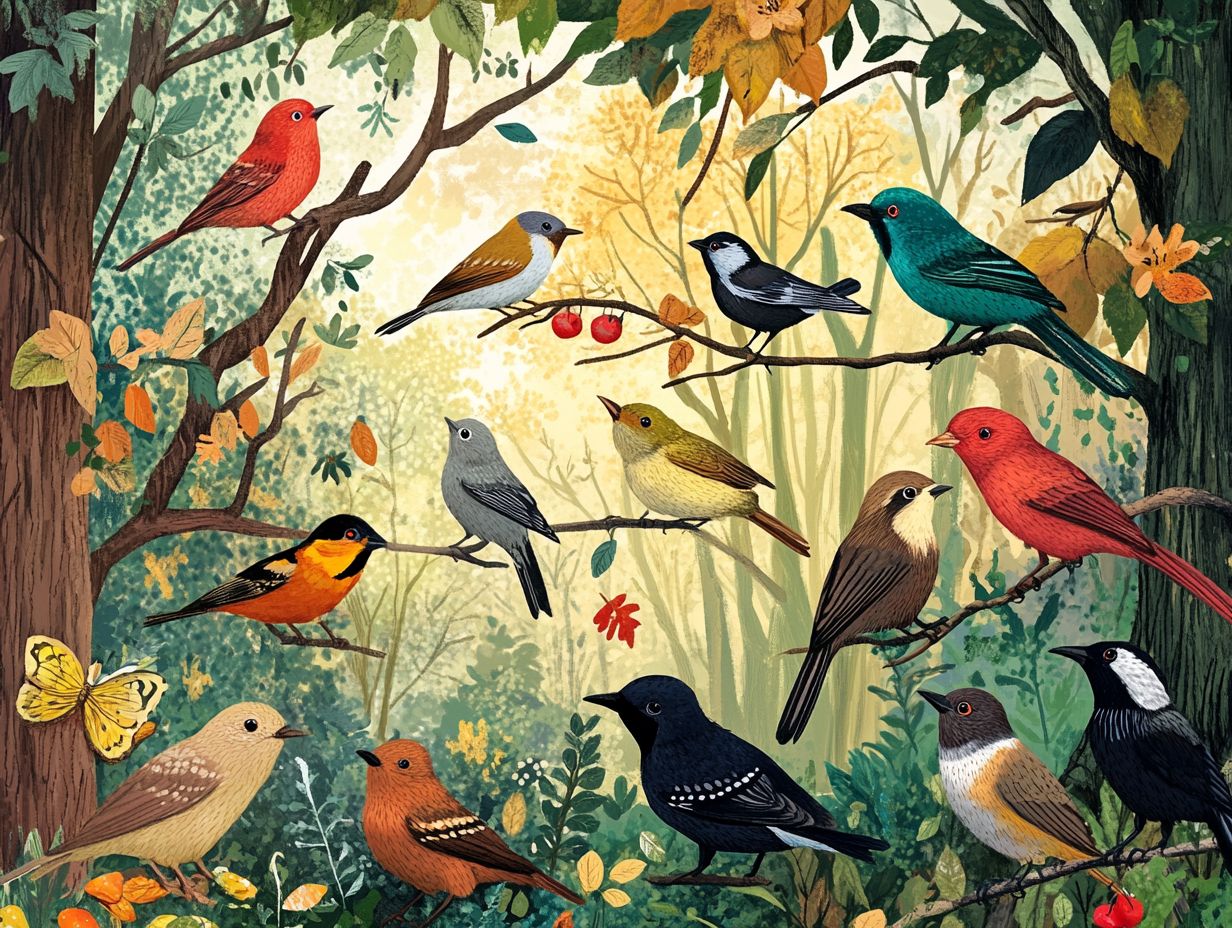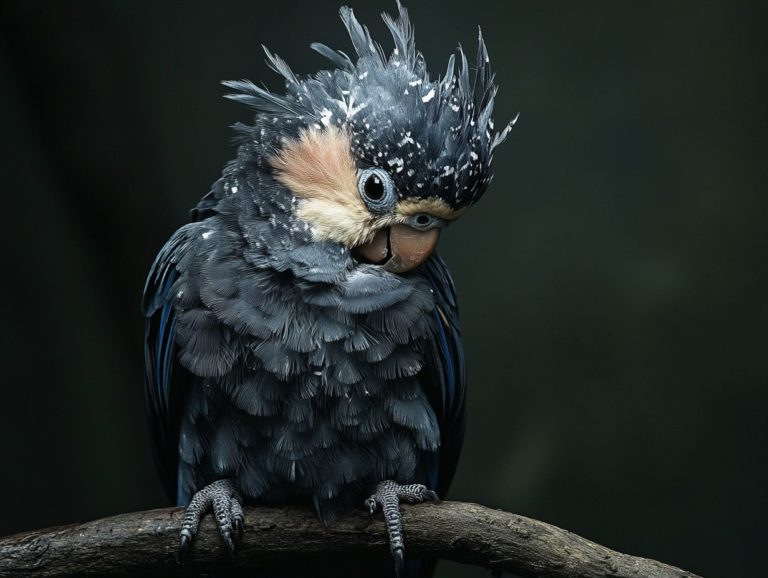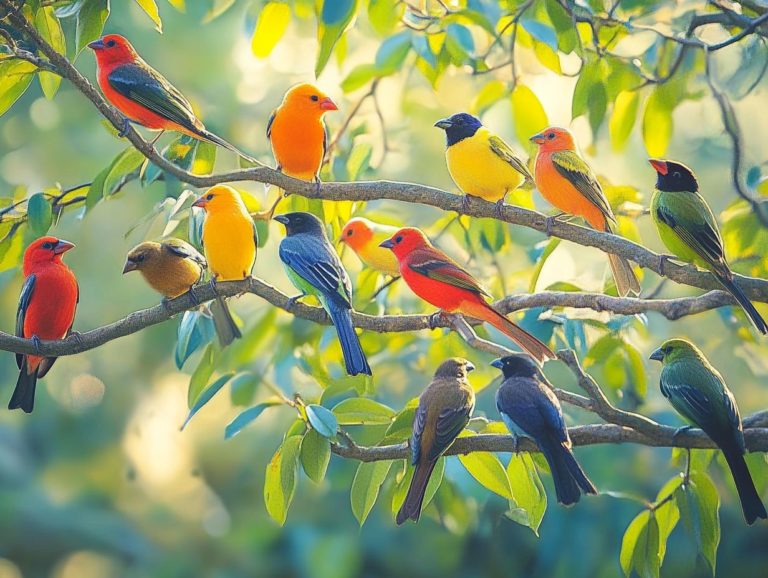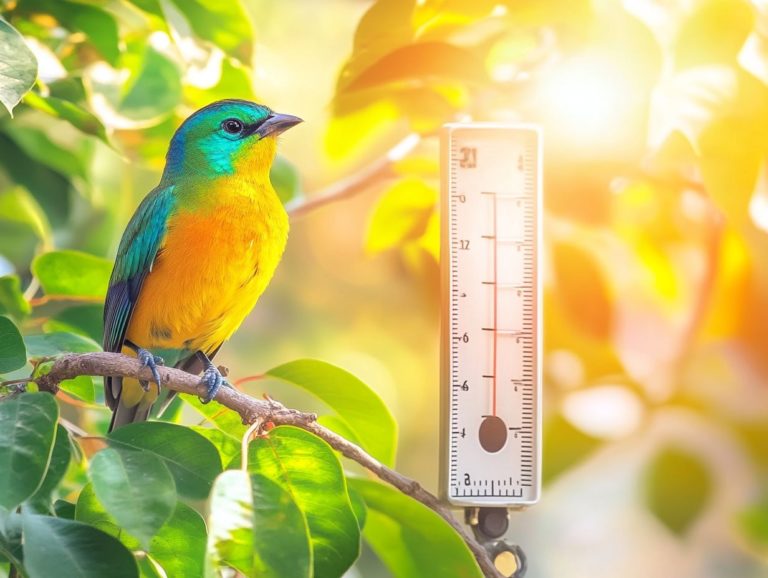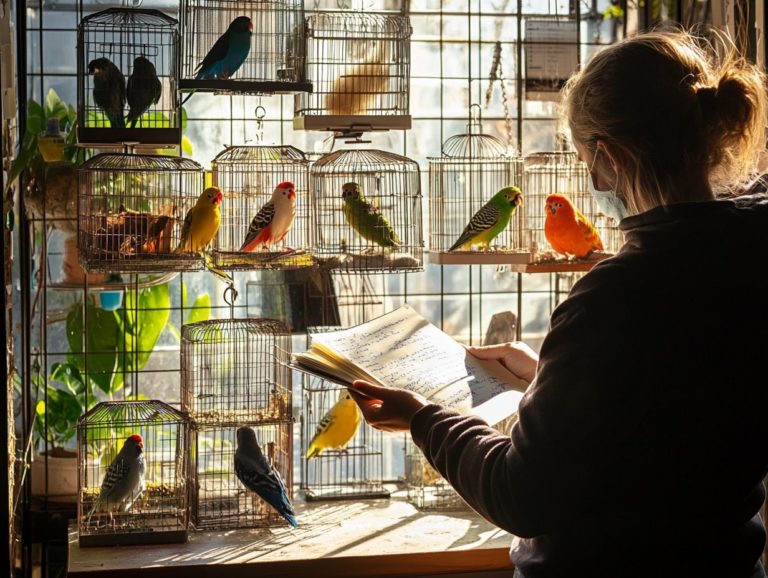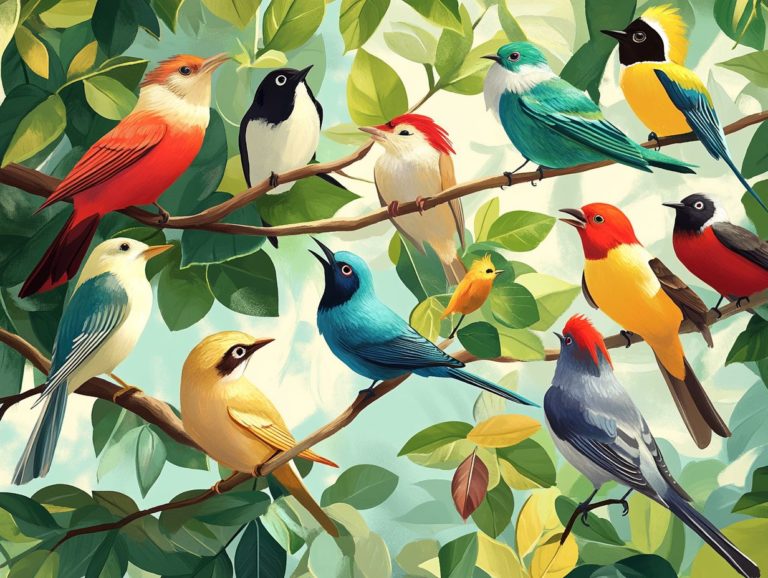The Link Between Diet and Behavior in Birds
Birds, with their colorful personalities and fascinating behaviors, are deeply influenced by their diet.
Understanding the link between what they eat and how they behave is essential, as nutritional choices can impact their physical health and mental well-being.
This article delves into the various dietary factors such as nutritional deficiencies, processed foods, and balanced diets that shape bird behavior. It also examines external influences that can further affect their actions.
Embark on this journey to uncover the vital relationship between a bird’s diet and its behavior.
Contents
- Key Takeaways:
- Diet and Behavior in Birds
- Impact of Diet on Bird Behavior
- How to Improve Bird Behavior Through Diet
- Factors Influencing Bird Behavior
- Frequently Asked Questions
- What is the link between diet and behavior in birds?
- How does diet affect bird behavior in the wild?
- Can a bird’s diet affect its mood and temperament?
- Do different bird species have different dietary requirements for optimal behavior?
- Can a poor diet lead to behavioral problems in pet birds?
- Are there any specific foods that can improve bird behavior?
Key Takeaways:
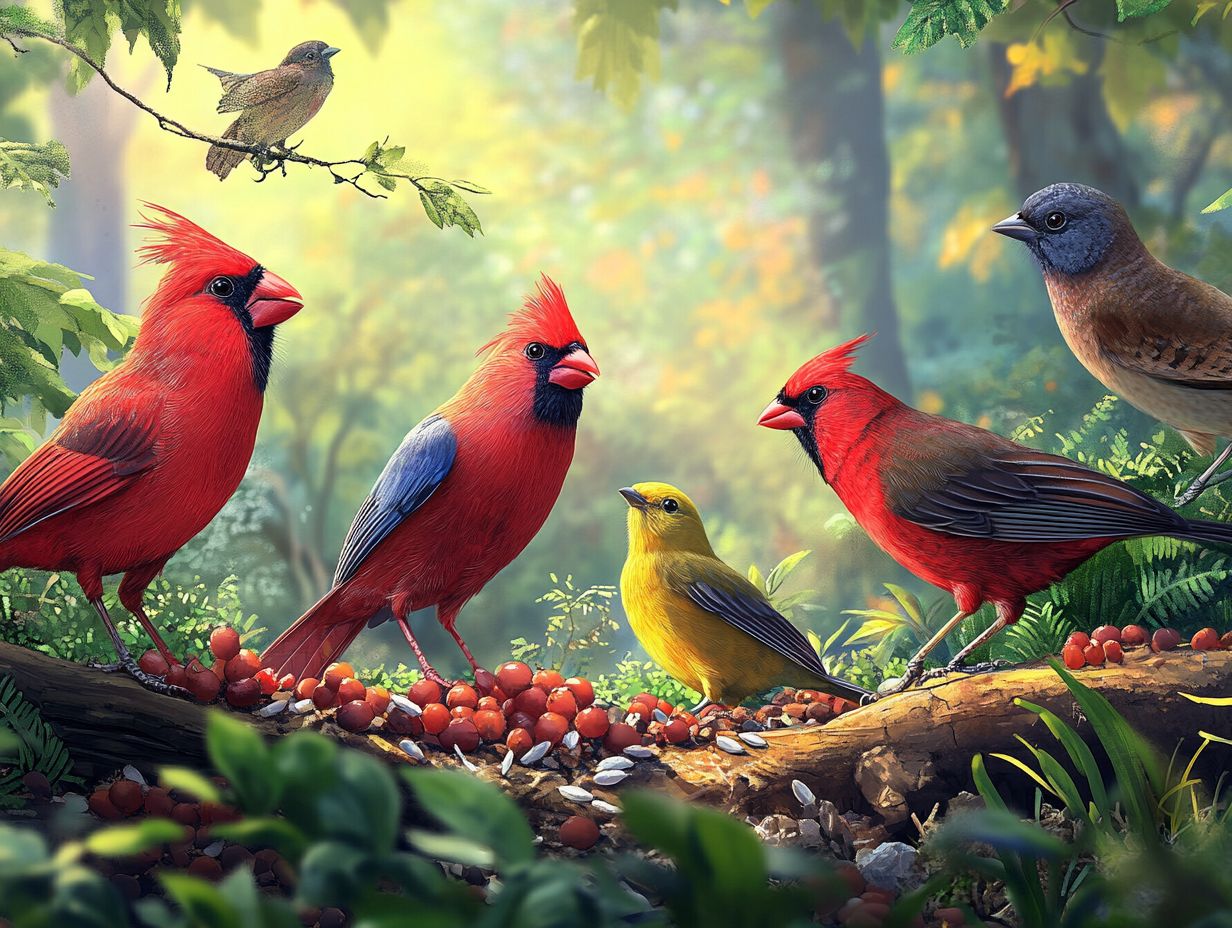
- Diet strongly influences bird behavior and health.
- Nutritional deficiencies and processed foods can harm behavior; a balanced diet leads to improvements.
- Consider environmental and social factors for a complete care strategy.
Diet and Behavior in Birds
Understanding the intricate relationship between diet and behavior in birds is essential for any avian enthusiast or pet owner. You ll find that birds, especially species like Amazon, Macaw, and Conure, truly flourish on a balanced diet.
A balanced diet profoundly affects their behavior, emotional well-being, and cognitive function.
Providing the right nutrition think pellets, fresh foods, and healthy fats can lead to vibrant feather health and diminish behavioral issues such as aggression and feather picking. This connection is vital for your bird s happiness!
This becomes even more crucial when considering New World Parrots, whose dietary needs can vary significantly among species like the Scarlet Macaw and Green-winged Macaw.
Impact of Diet on Bird Behavior
The impact of diet on bird behavior is profound, acting as a crucial factor in shaping their overall health and emotional well-being. Proper nutrition is essential in preventing clinical conditions and behavioral issues in birds, especially in species like Pionus and Conures, which can show signs of nutritional deficiencies if not adequately fed.
For example, an inadequate diet may result in aggression or feather picking, highlighting the importance of a comprehensive nutritional strategy.
Effects on Physical and Mental Health
The impact of diet on both the physical and mental health of birds is substantial, as proper nutrition is crucial for their good health. You need to ensure that their diet is rich in healthy fats, vitamins, and enzymes to maintain their overall health, which includes everything from feather quality to behavioral stability.
When these nutritional needs are met, you ll notice your birds exhibiting enhanced emotional resilience and cognitive function both vital for their well-being.
For example, omega-3 and omega-6 fatty acids, which you can find in seeds and nuts, play a key role in feather health by promoting shine and reducing molting issues. By incorporating a variety of fruits and vegetables into their diet, you provide them with essential vitamins like A and E, which support vibrant plumage and strengthen immune function.
A balanced diet not only contributes to their physical attributes but also helps mitigate behavioral problems such as feather plucking or aggression. This fosters a happier, more stable bird that thrives both physically and emotionally.
What changes can you make to your bird’s diet?
Common Dietary Factors Affecting Behavior
Common dietary factors that influence bird behavior are crucial for your feathered companions. Consider the types of food you offer like seed diets versus pellets and fresh options.
Many pet owners inadvertently contribute to behavioral issues in their parrots. These issues can include aggression and feather picking, often due to providing an unbalanced diet primarily consisting of seeds. This diet can lead to nutritional deficiencies and other problems.
By incorporating a diverse range of foods, you can significantly enhance your bird s behavior and overall health. The nutritional content and balance of these diets play a vital role in how your bird interacts with its surroundings.
While seed diets may be appealing, they often result in obesity and other health complications due to their high fat content and low vitamin levels. Conversely, pellets are specially formulated for a more balanced diet.
However, some birds might reject pellets because of their unfamiliar texture and taste. Fresh foods, including fruits and vegetables, provide essential vitamins and minerals while encouraging natural foraging behaviors.
Mixing pellets with fresh foods is a great way to offer healthier alternatives. This combination boosts your bird s nutritional intake and fosters positive behaviors, leading to a happier and healthier companion.
Nutritional Deficiencies and Excesses
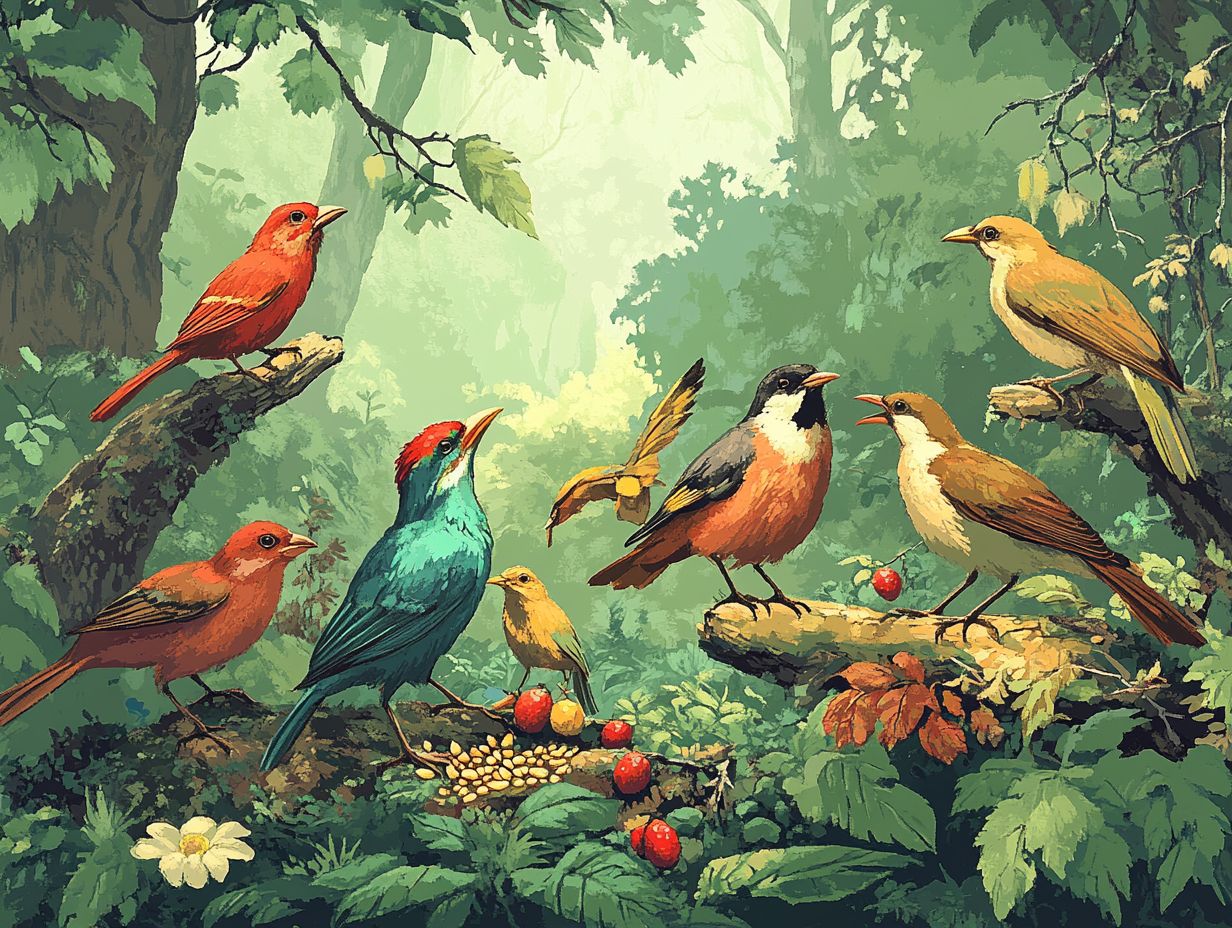
Nutritional deficiencies and excesses can lead to a spectrum of behavioral issues in birds. These issues directly affect their well-being and overall quality of life.
If they aren t getting enough essential vitamins, you might notice cognitive decline or even aggression. Conversely, overindulgence can result in obesity and various health problems.
Understanding these dietary imbalances is essential for optimizing your bird’s nutrition and behavior. For example, if your bird lacks B-vitamins, you might witness feather plucking or increased irritability.
These can be red flags indicating discomfort or stress. An overload of carbohydrates can also trigger rapid weight gain, leading to lethargy and a drop in playfulness.
A well-balanced diet rich in the right nutrients will make your bird happier and more playful! Regularly assessing their dietary intake helps you quickly pinpoint any potential deficiencies or excesses, ensuring your bird thrives both physically and behaviorally.
Processed vs. Natural Foods
The choice between processed and natural foods plays a crucial role in your bird’s diet and behavior. Each option offers its own set of benefits and drawbacks.
Processed foods, like pellets, can provide a balanced diet, but fresh foods are essential for enhancing nutrition and promoting natural foraging behaviors. Understanding these distinctions is key to ensuring optimal health and behavior for your pet bird.
Processed options often come fortified with vital vitamins and minerals. This makes meal planning a breeze for bird owners. However, they might lack the variety and richness found in whole, natural foods.
A diet mainly composed of fresh fruits, vegetables, and seeds can foster better digestive health. It also stimulates natural instincts, but requires more time and effort in preparation.
It’s wise for bird owners to strike a balance by incorporating both types of food in moderation. This approach allows you to harness the strengths of each while minimizing potential downsides.
A varied diet enriches your bird’s life and encourages healthier habits and behaviors.
How to Improve Bird Behavior Through Diet
Enhancing bird behavior through diet is achievable with thoughtful planning and a discerning selection of foods. By opting for the right choices, you can profoundly impact your birds’ emotional well-being and cognitive abilities.
Incorporating a harmonious blend of pellets, fresh foods, and essential nutrients like vitamins and minerals will not only promote improved behaviors but also contribute to healthier lifestyles for your feathered companions.
Don’t wait start mixing fresh foods into your bird’s diet today for a happier, healthier life!
Choosing the Right Foods
Choosing the right foods for your parrots is essential for their health and positive behavior. A balanced diet with high-quality pellets, fresh fruits, and vegetables provides necessary nutrients.
Different parrot species have unique dietary needs. For instance, larger parrots like Macaws thrive on fatty seeds, while smaller ones like Budgies prefer lower-fat options.
Brands like Zupreem offer pellets that ensure great nutrition. Kaytee provides fresh treats and seed mixes that stimulate foraging behavior.
Mixing pellets with fresh produce such as leafy greens, berries, and bell peppers creates a delightful diet for your feathered friends.
Creating a Balanced Diet Plan
A balanced diet plan is vital for your birds health and behavior. It should include a variety of pellets, fresh foods, and supplements.
Start with high-quality pellets, which should be about 70-80% of their diet. Add fresh fruits and vegetables like leafy greens, carrots, and berries for the remaining nutrition.
Here s a simple daily meal plan:
- Morning: Pellets like Zupreem or Kaytee
- Afternoon: A fresh vegetable medley
- Evening: A small serving of fruit
Introduce new foods gradually to help your birds adapt. This method prevents digestive upset and helps you learn their preferences.
Factors Influencing Bird Behavior
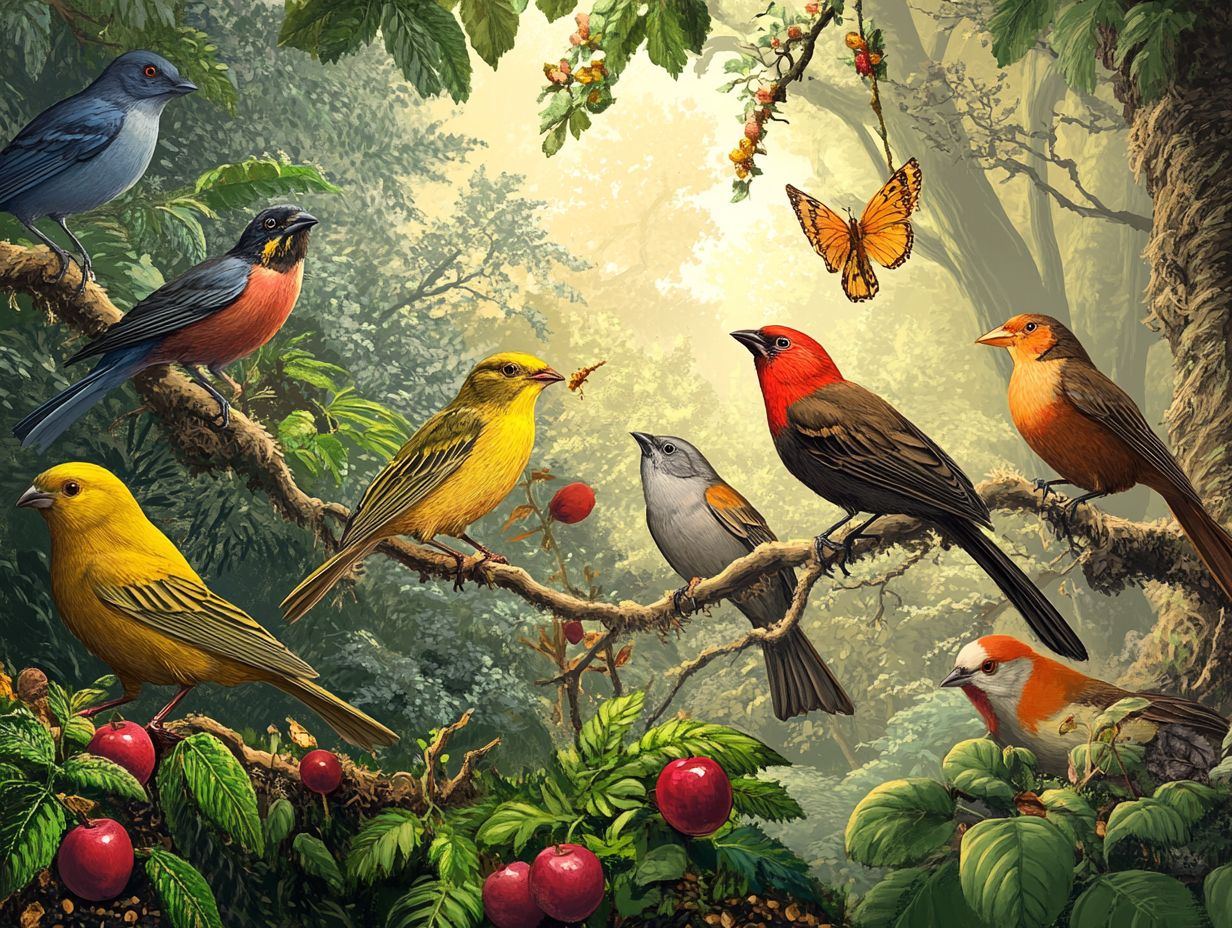
Besides diet, environmental and social factors significantly influence bird behavior. Elements like cage size, social interactions, and environmental stressors can affect their emotional well-being.
Understanding these influences helps create a balanced environment for your birds.
Environmental and Social Factors
Environmental and social factors shape bird behavior and emotional health. The size of their cage, available enrichment, and socialization affect their quality of life.
For example, larger cages filled with toys encourage exploration and reduce stress. This allows your birds to express their natural behaviors.
Encouraging positive interactions through gentle handling and companionship promotes happier birds. By focusing on active stimulation and social engagement, you enhance their emotional health and overall happiness!
Role of Avian Veterinarians
Avian veterinarians play a vital role in addressing dietary and behavioral issues in birds. They offer critical guidance on nutrition and health management. These specialists meticulously assess clinical conditions linked to poor diet and behavioral concerns, ensuring you are well-informed about the specific nutritional needs of your feathered friends.
They bring an impressive depth of knowledge, helping to prevent common ailments like obesity, feather plucking, and stomach problems that often stem from inappropriate feeding habits. By collaborating closely with you, avian veterinarians can design tailored dietary plans that cater to the unique requirements of each species, age, and health status.
They conduct comprehensive behavioral assessments that identify stressors and recommend effective strategies to enhance your avian companions’ well-being. Through this collaborative approach, avian veterinarians empower you to create healthier and happier environments for your beloved pets.
Frequently Asked Questions
-
What is the link between diet and behavior in birds?
Studies have shown that the type and quality of food consumed by birds can greatly influence their behavior, including mating habits, territorial behavior, and social interactions, highlighting the link between diet and feather health.
-
How does diet affect bird behavior in the wild?
In the wild, birds must forage for food, and their diet can vary significantly depending on the availability of resources. This can impact their behavior as they may need to compete for food or adjust their feeding strategies.
-
Can a bird’s diet affect its mood and temperament?
Yes! Just like humans, birds can experience changes in mood and temperament based on their diet. A diet low in essential nutrients can lead to irritability and aggressive behavior in birds.
-
Do different bird species have different dietary requirements for optimal behavior?
Yes! Each bird species has its own unique dietary requirements for optimal health and behavior. For instance, seed-eating birds need different nutrients than insectivorous birds.
-
Can a poor diet lead to behavioral problems in pet birds?
Absolutely. A poor diet can lead to various behavioral issues in pet birds, such as feather plucking, aggression, and hormonal imbalances. Providing a balanced and varied diet is crucial to prevent these issues.
-
Are there any specific foods that can improve bird behavior?
Yes! Incorporating certain foods, like leafy greens and fresh fruits, into a bird’s diet can promote overall health and well-being, leading to improved behavior.
Have more questions? Ask your avian vet today!

